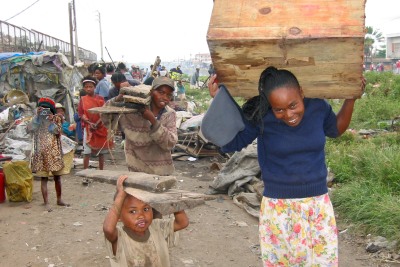Peace and mutual recognition

Second day of the Colloquium:
« When the violence that is experienced by people living in extreme poverty is recognised, that brings a sort of peace to the soul ». It is through this recognition, as spoken of by Ronald Schexnayder, that pathways for peace can be built. Ronald is a member of ATD Fourth World Movement Task Force, in New Orleans, USA.
After yesterday’s discussions and testimonies on the violence of extreme poverty, exchanges today centred on the type of peace participants wish to build in society. The ways in which to build this peace were also examined.
Participants discovered that peace was defined in different ways according to the context of those living it, or denied it. In Rwanda a youth group from Umuseke Association stated that peace was having enough to eat, proper health care, and access to education. Peace was also defined as a feeling that needs to be internal before being able to reproduce it by building with others. Christophe Géroudet, an ATD Fourth World volunteer in Bolivia, reminded us that extreme poverty destroys human beings. Indeed, it can lead to self destruction, when one is ignored as a human being, due to repeated acts of humiliation, a lack of recognition, and a lack of self-esteem. It demands enormous ressources of strength and courage to lift oneself, and others, out of violence and up towards peace building.
As Deirdre Mauss, also a member of ATD New Orleans Task Force, said, « Peace doesn’t always happen in a big bang », and there are many pathways to peace. Showing kindness to someone who shows little, for example, but also working together to educate for peace. Hoang Thi Cong Ngoc Nguyen works at the Catalyst Foundation, in Vietnam. She underscored the importance of working in partnership with people in extreme poverty, through projects that allow all participants to learn from one another.
In ATD Fourth World’s Live-In Family Developmen project in Noisy le Grand, France, cultural and artistic projects have been set up. Through active participation in the projects, children and adults discover unimagined capabilities of which to be proud. Through sharing and recognition of the equal value of all as human beings, peace is built in the community.
People living in extreme poverty, academics and development workers shared and blended their life experiences and knowledge, one day two of the Colloquium, as they did on day one. Coming together to share these experiences, with the aim of sharing them further, outside of the circle of participants, is most definitely a large step towards building peace together.
See below several interviews of participants

Play with Vimeo
By clicking on the video you accept that Vimeo drop its cookies on your browser.
Interview of Jacqueline Uwimana (Rwanda)

Play with Vimeo
By clicking on the video you accept that Vimeo drop its cookies on your browser.
Marie Odile Maire Sandoz (France)

Play with Vimeo
By clicking on the video you accept that Vimeo drop its cookies on your browser.
Interview de Lucie Roy (Canada)

Play with Vimeo
By clicking on the video you accept that Vimeo drop its cookies on your browser.

